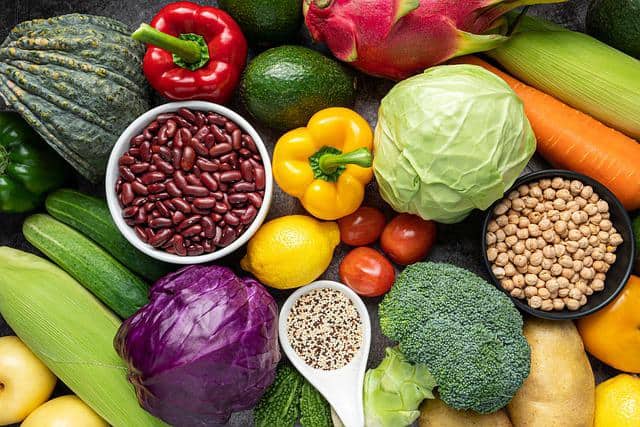-By: Bhavisha Changrani
Menopause is a natural phase in a woman’s life, typically occurring around age 50, marking the end of menstrual cycles and the fertility period. During this transition, hormonal changes can bring about a variety of physical and emotional symptoms, such as hot flashes, night sweats, mood swings, weight gain, and reduced bone density. While hormone replacement therapy (HRT) and other treatments can help manage symptoms, adopting a balanced diet plays a crucial role in supporting overall health during menopause.
A nutritious diet can help alleviate menopause symptoms, support bone health, maintain a healthy weight, and improve mood and energy levels. Below, we explore the essential dietary components for women going through menopause.

Foods to Manage Hot Flashes and Night Sweats
Night sweats and hot flashes are two of the most prevalent menopausal symptoms.. Certain foods can help regulate body temperature and support hormone balance, potentially reducing the frequency and intensity of these symptoms.
Phytoestrogen-rich foods:
Foods high in phytoestrogens: Phytoestrogens are plant substances that imitate estrogen in the body.Consuming foods rich in phytoestrogens may help alleviate some menopause symptoms by providing a mild estrogenic effect. Common sources include:
Soy products (tofu, tempeh, edamame)
Flaxseeds (ground flaxseeds are particularly effective)
Chickpeas and lentils
Alfalfa sprouts

Cooling foods:
Some foods are thought to have a natural cooling effect on the body. These include:
Cucumbers
Mint
Coconut water
Leafy greens

Bone Health: Preventing Osteoporosis
As estrogen is essential for bone density, osteoporosis risk rises when estrogen levels fall after menopause.. A well-balanced diet rich in calcium and vitamin D can help protect bones and reduce the risk of fractures.
Calcium-rich foods:
Aim for 1,200 mg of calcium per day after menopause. Excellent sources include:
Dairy products (milk, cheese, yogurt)
Leafy green vegetables (kale, collard greens, broccoli)
Fortified plant-based milks (almond, soy, oat)
Tofu and tempeh
Vitamin D:
Vitamin D is crucial for calcium absorption. Sunlight is the best source, but dietary sources include:
Fatty fish (salmon, mackerel, sardines)
Egg yolks
Fortified foods (milk, cereals, orange juice)

Maintaining a Healthy Weight
Due to changes in metabolism, a loss of muscle mass, and hormonal swings, many women gain weight during menopause.. A healthy diet can help manage weight by promoting fat loss while preserving lean muscle mass.
Protein-rich foods:
Protein helps build and maintain muscle, which is essential during menopause to prevent age-related muscle loss. Great sources of protein include:
Lean meats (chicken, turkey, fish)
Legumes (lentils, beans)
Nuts and seeds
Eggs
Low-fat dairy

Healthy fats:
Include heart-healthy fats to support overall wellness and reduce inflammation. Foods high in omega-3 fatty acids may also help regulate mood and improve joint health:
Fatty fish (salmon, sardines, mackerel)
Flaxseeds and chia seeds
Nuts (walnuts, almonds)
Olive oil
Fiber:
High-fiber foods can aid in digestion, improve satiety, and help manage weight. Fiber-rich options include:
Whole grains (oats, quinoa, brown rice)
Vegetables and fruits (berries, apples, carrots, spinach)
Legumes (beans, lentils)

Supporting Mood and Mental Health
Hormonal changes during menopause can affect mood, leading to irritability, anxiety, and depression. A balanced diet that supports brain health can be beneficial for managing emotional well-being.
Omega-3 fatty acids:
Omega-3s, found in fatty fish, flaxseeds, and walnuts, are known to help support brain function and stabilize mood.
B vitamins:
B vitamins, particularly B6 and B12, play a role in energy production and mood regulation. Foods rich in B vitamins include:
Whole grains (brown rice, oats, barley)
Leafy green vegetables (spinach, kale)
Eggs and dairy products
Nuts and seeds

Magnesium:
Magnesium helps to reduce stress and improve sleep quality. It is found in foods like:
Leafy greens (spinach, swiss chard)
Nuts and seeds (almonds, pumpkin seeds)
Whole grains (brown rice, quinoa)
Bananas and avocados
Hydration

During menopause, women are more likely to experience dehydration due to night sweats and hot flashes. Staying hydrated is important for regulating body temperature, supporting digestion, and maintaining energy levels. Aim to drink plenty of water throughout the day, and include hydrating foods like:
Cucumbers
Watermelon
Citrus fruits
Herbal teas (peppermint, chamomile)
Foods to Limit During Menopause
Certain foods may exacerbate menopause symptoms, particularly hot flashes and weight gain. Limiting these foods can improve overall health and comfort during this stage of life.
Caffeine:
Caffeine can trigger hot flashes and disrupt sleep. Consider cutting back on coffee, energy drinks, and caffeinated sodas.
Alcohol:
Alcohol can also increase hot flashes and interfere with sleep, so it’s best consumed in moderation or avoided altogether.
Sugar and refined carbohydrates:
These can contribute to weight gain and exacerbate blood sugar imbalances. Focus on whole grains and limit sugary foods and beverages.
Processed foods:
Highly processed foods with excess salt, sugar, and unhealthy fats can contribute to inflammation, weight gain, and poor health outcomes.

Conclusion
Menopause is a natural phase in life, but managing its symptoms through diet can make a significant difference in comfort and overall well-being. A nutrient-rich diet, focused on bone health, hormonal balance, weight management, and mental wellness, can support a woman through this transition. Incorporating more plant-based foods, healthy fats, proteins, and hydrating options while limiting processed foods, caffeine, and alcohol can help alleviate symptoms and promote long-term health. As always, it’s important to consult a healthcare professional or dietitian to personalize dietary choices based on individual needs.













